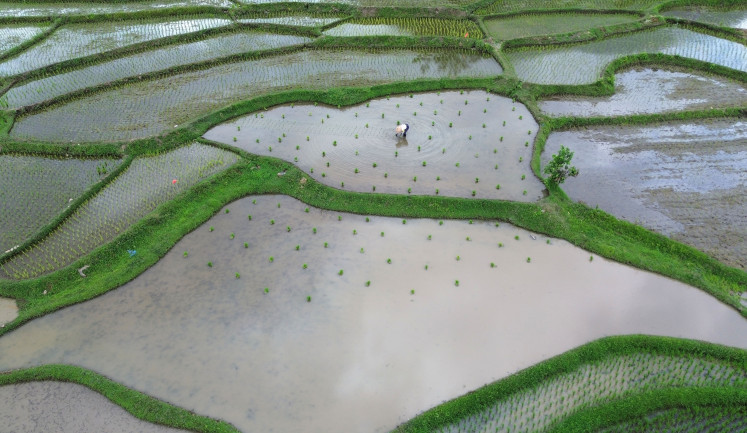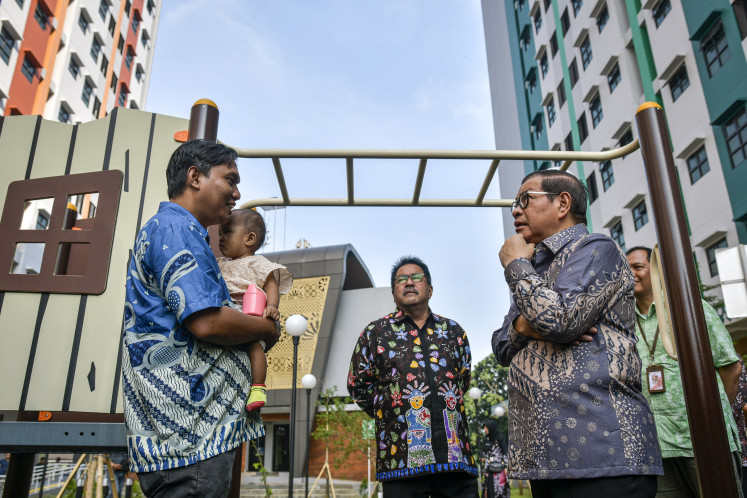Popular Reads
Top Results
Can't find what you're looking for?
View all search resultsPopular Reads
Top Results
Can't find what you're looking for?
View all search resultsPromoting volunteerism in Indonesia
Some countries have developed national volunteer programs that are accessible to most young people, including those who are vulnerable, for example, young people living with disabilities.
Change text size
Gift Premium Articles
to Anyone
I
magine you are a young person in Indonesia and are striving to do something productive – useful for yourself but also something meaningful for society. You believe you can contribute and help your country, playing a part in the overarching mission recently set by President Joko “Jokowi” Widodo to make a leap forward out of the immense crisis caused by COVID-19.
You look for opportunities around you and the first thing you do is to type the word “volunteering” into an internet search engine. Surprisingly, you will find that many volunteer opportunities available are for foreign students and young travelers who, before the pandemic, would flock to the country to immerse themselves in a new culture and learn new customs.
For those young people, Indonesia has offered a great opportunity to open their minds, learn new skills and partner with local communities. For them, international volunteering experience provided a chance to grow, hone soft skills and develop leadership qualities.
If such opportunities are available to foreign young people, why not to locals? Certainly there are several not-for-profit organizations offering volunteer opportunities for Indonesian citizens, including the scouts and some programs affiliated with religious organizations, but why not have something bigger, bolder and easily available to all young people?
With a demographic “window of opportunity” opening up, volunteerism could help young people develop their agency and cultivate a sense of meaning and belonging in society.
There is no better time to leverage the power of volunteerism than now that planning for the recovery is at full speed and tons of new ideas that earlier might have been unthinkable are being seriously considered. It is time to make the case for volunteerism, a national asset that fully embraces the spirit of support enshrined in the principle of gotong royong (mutual cooperation).
As Education and Culture Minister Nadiem Makarim tries to modernize and reinvigorate the national educational curriculum, bringing up new concrete, tangible programs to make it more real, relevant and practical for learners, volunteerism is the best platform to harness students’ and teachers’ skills.
We can imagine thousands of community-run schools leading the way in promoting “service and learning” work, a concept that is actually already embedded in local communities not only in Indonesia but also throughout the Asia-Pacific region.
Volunteering is also a great a way to hone the skills and knowledge of teachers thanks to engaging learning activities that can put students closer to their communities, helping them develop not only a critical understanding of local problems but also critical problem solving skills.
Let’s not forget that Indonesia is seeking to localize Sustainable Development Goals (SDGs). We can imagine how students can be part of the solution to many problems affecting local people.
If we want to get Indonesia back on track and sprinting toward a new future, localized intergenerational partnerships with students working alongside elders are going to be indispensable.
In almost any area of study, students can apply their classroom learning. Imagine small children at the elementary level learning about local fauna and nature, getting acquainted with the risks of unscrupulous industrialization and modern ways of living that threaten their future.
Higher education students could partner with their teachers and local authorities to solve some problems caused by massive urbanization.
While volunteerism should be embraced in the learning process from the first stages of learning to higher education with universities playing an extremely important role, there is much more scope for it to support the process of growth of millions of millennials who are now frustrated and out of jobs.
Some countries have developed national volunteer programs that are accessible to most young people, including those who are vulnerable, for example, young people living with disabilities.
The United States, for example, has a federally mandated agency, the Corporation for National and Community Service, that works with state volunteering commissions to support national and local volunteer programs. Closer to Indonesia, Singapore has embraced volunteerism and the spirit of solidarity embedded in it to create a more resilient cohesive nation.
In Indonesia, organizations that promote volunteerism should be supported with special grants to allow them not only to improve the effectiveness of their work but also to scale up. At the same time, there is a need to think big with a national volunteer program complemented by local stakeholders, including local government agencies and other not-for-profits.
The young people who have been neglected the most and are experiencing what looks like an unbreakable cycle of vulnerability and deprivation, should the first to be able to access to such programs.
There is no better way to start projecting the country into a new era than announcing a national effort to promote volunteerism.
Indonesia’s achievements in the last 75 years of independence are remarkable, but so much remains to be done. The new decade could harness volunteerism, helping Indonesia reach a new economic status in 25 years, helping disillusioned and detached youth discover a new pathway of self-growth and creating the conditions for them to actively contribute.
As President Joko “Jokowi” Widodo has said, the pandemic is an opportunity to restart in a big way. Investing in the promotion of volunteerism is a safe bet for the country to achieve ambitious new goals.
Cofounder of ENGAGE and writer on social inclusion, youth development and regional integration as an engine to improve people’s lives in Asia










